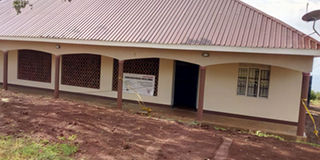Education will reduce gender based violence, says gender official

Kween Women Protection Centre that was handed over to Kween District by officials from Action Aid International Uganda. Couresty photo
Keeping the girl child at school by fighting early marriages is a critical method of preventing gender based violence, according to a senior official in the Ministry of Gender, Labour and Social Development.
Ms Angella Nakafeero, the commissioner in charge gender and social development says that when a more girls are educated, the rights of women will not be easily violated.
“We need to say no to child marriages, genital female mutilation and other vices that violate the rights of women. We should keep the girls at school and ensure that their homes are safe,” she said.
She was speaking at the handing over of Kween Women Protection Centre to Kween District officials early this week.
“Let’s protect girls from defilement and ensure that they complete school and grow up with dignity,” she said. “To women and girls, please don’t die in silence. Take action and report cases of violence. Change will start from there.”
She asked men and boys to be allies of women to stop genital female mutilation in Sebei Sub-region, where the practice is rampant.
Ms Nakafeero said that effort by agencies like Action Aid International Uganda (AIIU), the lead agency in the construction of the shelter with support from the United Kingdom and Kween District, are welcome because they make it easier for victims of gender based violence to report the perpetuators and get psycho-social support.
She said that the gender ministry intends to mainstream such shelters and homes in their planning and social sector development plan so that women in other parts of the country can get similar services.
Mr Xavier Ejoyi, the country director of AIIU asked Kween resident not only to celebrate the new shelter but the purpose for which it was constructed.
“We should celebrated a resilient woman who has overcome violence and has been given a second chance through the services offered in these safe spaces. Supporting survivors is possible even if it takes a long time just like constructing this shelter, the outcome is what they should focus on,” he said.
The shelter was built under SURGE project that was funded by DFID and UK Aid.
The project is scheduled to end in August.
Mr Ejoyi asked local leaders, police personel and health workers to sustain the ideals of the project to promote social justice among vulnerable groups.



